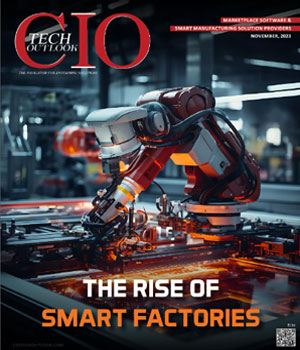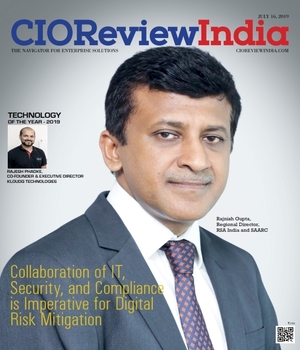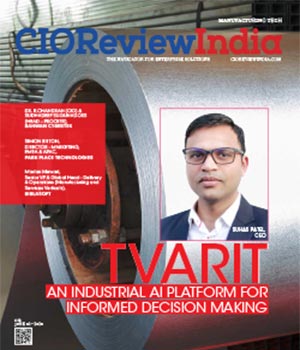
DIGITIZATION IN MANUFACTURING
By T.G. Dhandapani, Group CIO, TVS Motor Company | Monday, 17 September 2018, 13:25 IST
 The importance of Manufacturing industry need not be over emphasised as Manufacturing holds a key position in the Indian economy, accounting for nearly 16 per cent of the real GDP (poised to reach 22% by 2020) and employing about 12 per cent of the country’s labour force. The need of the hour in Manufacturing is to gallop the productivity and quality to be strong player in the global market especially to fight against China. While China has specialised high volume flat components, global players in Tier I manufacturing industries especially in automotive look at Indian Companies for engineered products. The role of digital in transforming manufacturing industry is strong as many Japanese manufacturing best practices like Kanban, Just in time, TQM, TPM have already practiced well in India companies. Digitising these practices to sustain adherence and bring continuous improvement both marginal and breakthrough at all levels of the organisation and all functions.
The importance of Manufacturing industry need not be over emphasised as Manufacturing holds a key position in the Indian economy, accounting for nearly 16 per cent of the real GDP (poised to reach 22% by 2020) and employing about 12 per cent of the country’s labour force. The need of the hour in Manufacturing is to gallop the productivity and quality to be strong player in the global market especially to fight against China. While China has specialised high volume flat components, global players in Tier I manufacturing industries especially in automotive look at Indian Companies for engineered products. The role of digital in transforming manufacturing industry is strong as many Japanese manufacturing best practices like Kanban, Just in time, TQM, TPM have already practiced well in India companies. Digitising these practices to sustain adherence and bring continuous improvement both marginal and breakthrough at all levels of the organisation and all functions.
After disrupting industries of finance, consumer products, healthcare, media, the digital revolution is now penetrating well in manufacturing. Indeed, the explosion in data and new computing capabilities—along with advances in other areas such as artificial intelligence, automation and robotics, additive technology, and human-machine interaction—are unleashing innovations that is changing the nature of manufacturing itself. The digital-manufacturing technologies will transform every link in the manufacturing value chain, from research and development, supply chain, and factory operations to marketing, sales, and service. Digital connectivity among designers, managers, workers, consumers, and physical industrial assets will unlock enormous value and change the manufacturing landscape forever.
Yet while manufacturing generates more data (through IOT, ERP, CRM, DMS, Supply chain, PLM and so on) than any other sector of the economy, few companies are harnessing it. A good visionary digital
organisation can close this gap by tapping the data they generate not only in commercial transactions but more especially from shop floor as well what’s publicly available will uncover valuable insights to drive profits and growth. The data collected through connected devices in the shop floor can be fruitfully used to:
a) Increase productivity – overall plant efficiency
b) Increase quality – by controlling process parameters and preventing defects
c) Enhance compliance especially in the areas of environment, health and safety
d) Traceability – inventory, online production, genealogy and so on. Calling back only those few hundred parts or vehicle rather than calling back thousands and millions of parts or vehicle, may be the single largest benefit of digitization.
e) Connected vehicles and customers – to service better, up sale, cross sale
Consider traditional car manufacturers and Uber, which are both—at the highest level—in the business of moving people around. Car makers meet that need on the floors of factories and showrooms, using a century of manufacturing experience. Uber meets people’s transportation needs not with steel, glass, rubber, and salespeople but with data, matching individual riders and vehicles via smart phones. Barely five years into its existence, it is valued at about $50 billion though personally I am of the view that this number is notional at macro level. Uber’s data, algorithms, and enormous growth prospects have already made it more valuable than all of the physical assets, intellectual property, and brand names of some of the world’s biggest car manufacturers.
Initiatives of digitisation in manufacturing can be classified under three heads:
• Hygiene projects – where the compliance, security, sustenance and similar are taken care of
• Projects for business benefits - Real ROI in terms of increasing productivity and quality
• Strategic projects – where initiatives like customer connect, traceability, connected vehicles will give enduring benefits.
“Many good things can be achieved through digitisation strategy in manufacturing Industry but digitisation for its sake will be a catastrophe”
All said and done, the real cream of digitization in manufacturing is in analysis of data. This like kaleidoscope, will give different insights at different point of time. It may redefine complex process parameters, “provide scientific reasons to the thumb rules established over decades and centuries, automate “design of experiments, prevent defects and provide best customer satisfaction. One of the main challenges of manufacturing industry today is the age of the employees. The well-established practices, knowledge gained and rules formulated need to be transformed to younger generation who are smart but not having patience to wait and learn. If not handled properly, it will result in reinventing the wheel again. Another major hindrance is the age of the devices and machines, procured over a period decades good enough to give quality output any not enough to get connected. Top management commitment to establish a right plan of replacement, change management, drive ROI and adherence is the way for success. One of the best practices in digitization in manufacturing is to digitize critical process where the legacy boat is burnt and all stakeholders are pushed to fight out in the new island of Digital Organization. Also it’s a great opportunity for IT engineers and CIOs to grease their palms to maintain plant and machineries in the shop-floor. CIOs who were confined to Datacentres in 1990s were rubbing shoulders with commercial CXOs during ERP era, collaborating with marketing managers during DMS and CRM period, handshaking with design engineers during PLM now more seen in shop-floor during Industry 4.0.
In summary, many good things can be achieved through digitisation strategy in manufacturing Industry but digitisation for its sake will be a catastrophe. Most of the managers are made as they are taking well informed decisions but all entrepreneurs are born. Perhaps Industry 5.0 may address this gap and ensure sustenance of benefits of Industry 4.0 as the investment is sizeable.
CIO Viewpoint
Novel Manufacturing Technologies to Accelerate...
By Abhrasnata Das
Manufacturing IT: A Journey Towards Robust Future
By Manish Chandegara, CIO, Cera Group
Revolutionizing the Electrical Equipment...
By Janifha Evangeline
CXO Insights
AI/ML: Enhancing the Efficiency of Predictive...
By Govind Singh, Group CIO, Dalmia Bharat
Prime Aspects Successful Business Leaders...
By - Santosh Rai, Chief Information Officer, Asahi India Glass
How Industry 4.0 is Transforming the...









